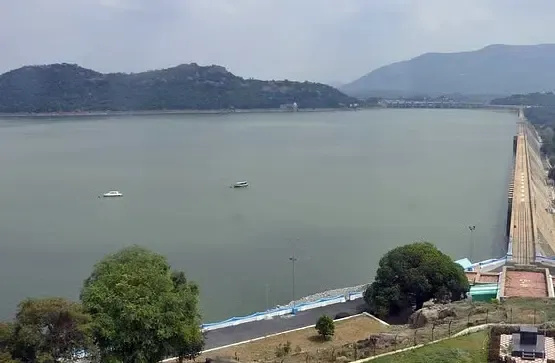Desilting in Delta Region to Conclude by May, TN Minister Confirms

Synopsis
Key Takeaways
- Desilting in Tamil Nadu's Delta region to finish by May.
- Rs 120 crore allocated for over 1,000 desilting projects.
- Farmers welcome timely desilting efforts.
- Water release from Mettur Dam is crucial for irrigation.
- Concerns over water availability due to interstate disputes.
Chennai, April 13 (NationPress) With water from the Mettur Dam set to be released on the traditional date of June 12, desilting activities throughout Tamil Nadu's Delta region are expected to wrap up by the end of May to facilitate uninterrupted water flow to tail-end agricultural zones, stated Water Resources Minister S. Duraimurugan on Sunday.
In his announcement, the Minister revealed that a total of Rs 120 crore has been allocated for 1,071 desilting projects spanning 6,179 km across the Tiruchirappalli, Chennai, Madurai, and Coimbatore areas.
Specifically, in Thanjavur district, 4,760 km of waterways have been desilted over the past four years with an investment of Rs 85.97 crore, and this year's efforts will cover 1,380 km with a budget of Rs 26.28 crore.
Duraimurugan confirmed that Chief Minister M.K. Stalin will oversee the water release from the Mettur Dam on June 12, in keeping with a long-standing tradition. He instructed officials to ensure that water flows to the tail-end regions without hindrance, promoting the irrigation of extensive farmland.
The Minister highlighted that preparations are in progress to ready the canal network and expressed optimism that timely water delivery will avert crop losses during the upcoming monsoon season. He added that officials from the Water Resources Department (WRD) are vigilantly monitoring the desilting operations and addressing feedback from farmers across all regions.
Farmers from the Delta have reportedly welcomed the prompt initiation of the desilting efforts and have conveyed their appreciation to the state government.
Usually, the water release from the Mettur Dam for irrigation in the Cauvery Delta ceases after January 28. However, depending on reservoir levels, the government frequently permits continuous release of 1,500 to 3,000 cusecs of water to support various irrigation canals including Raja Kumarapalayam, Mohanur, Kattuputhur, Vadakarai, Ayyan, Peruvalai, and Srirangam Nattu Vaickal, along with 17 tributary canals in areas such as Pugalur, Vaangal, Nerur, Krishnarayapuram, Thenkarai, and Uyyakondan.
These canals play a crucial role in irrigating various crops, such as bananas, sugarcane, pulses, oilseeds, turmeric, betel vine, flowers, and korai grass. In low-lying areas, summer paddy is also extensively cultivated.
Farmers are now requesting a daily release of at least 3,000 cusecs of water to safeguard standing crops across thousands of hectares.
While the Mettur Dam is vital for sustaining agriculture in the delta region, erratic water releases from the Cauvery River in recent years -- worsened by the interstate water-sharing conflict with Karnataka -- have compelled farmers to increasingly rely on groundwater and rainfall.
According to leaders from the Tamil Nadu Farmers’ Association, Karnataka's proposal to construct a dam at Mekedatu has heightened worries among delta farmers, who are apprehensive about further reductions in water availability.
Despite the current water level in the Mettur Dam being at 108.7 ft, only 1,003 cusecs of water are being released, forcing numerous farmers to abandon summer paddy cultivation.
It is noteworthy that during the northeast monsoon, Tamil Nadu's reservoirs were nearly at full capacity, with 12 reservoirs -- including three in Coimbatore, seven in Madurai, and two in Chennai -- reaching 100 percent capacity, as reported by the WRD.









